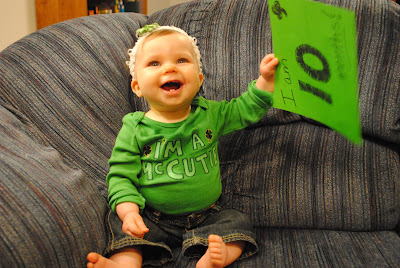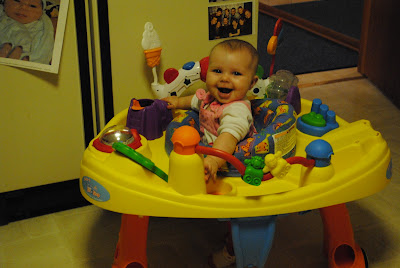For those of you who are wondering, here is our vaccination story that we were interviewed about for PBS. Not sharing this with a desire to start a debate, just to share our journey:
Before becoming pregnant, it never crossed my mind that vaccinations were an option. Once pregnant, Matt was the catalyst for us becoming more educated on the topic. Some of our friends had children and began the conversation about whether or not they would vaccinate their children. One of them passed us a book, "What Your Doctor May Not Tell You About Children Vaccinations". Basically, the book talks about some of the side effects that could be possible and it has full chapters on the different vaccines, their history, what they're made of and the possible side effects. There was a whole chapter on autism and another on mercury. As I first began to read the book, I told Matt I no longer wanted to vaccinate Rilyn. I kind of felt like I would be a bad parent for "exposing" her to them. But the more I read and the more I had conversations with our doctors, the more convinced I was that all vaccinations were right for us. Here are some reasons why:
- We struggled, being Christians, with whether or not we were being trusting enough that God would protect Rilyn if we had her vaccinated. However, in praying about it and talking with others, we strongly believe that God has placed people who are passionate about medicine in the field that they are in to help protect us from diseases.
- My conversation with our family physician was pivotal for us. In a nutshell, he told me he stood 100% behind the vaccinations and vaccinated all of his children himself. I told him we were thinking of "picking and choosing" which vaccines to give her, for instance I didn't see the necessity for the Chicken Pox vaccines. You hear about 'chicken pox' parties and how its better to have it as a child than as an adult. However, he said its now become a necessary vaccine because most children are now vaccinated. Which means, its basically non-existant in children. If you're not vaccinated as a child, you're open to it as an adult, which is way worse.
- He also talked about "herd immunity" and said if we chose not to vaccinate Rilyn, we were relying upon everyone else to vaccinate their children to protect Rilyn from getting sick. This was HUGE for me. Not only was it important to protect my child, but to have a larger world-view. Even if Rilyn never got sick, she could be a carrier for a disease and pass it along to someone else and vice versa. By vaccinating Rilyn, I'm not only protecting my child, I'm also protecting other people's children. And my hope is that they would consider the same thing.
- Which brings me to my next point. In the book and in other conversations, it was brought up that the Mumps vaccine wasn't necessary for girls because they didn't experience any harmful side effects like boys do. However, girls can be carriers of the disease, thus passing it on to boys who could get it. If we had a son, I would hate for Rilyn to pass it on to him. Or to any other child. Again, this is where the "world-view" comes into play for us.
Today, during the interview, the guy asked Matt and I if we got the flu vaccine. Matt answered honestly, that he doesn't because he doesn't get sick. I answered that yes I do most years. Both of us realized that we weren't really living this out ourselves! WE could pass on things to Rilyn as well! So we were really challenged by that today.
My encouragement to anyone, especially new parents, is to educate yourselves, be engaged in the process and don't be afraid to ask questions! One time, we broke up how many immunizations were given to Rilyn at a time. We had three one appointment, and came back a month later for the other two.
**Also, today during the interview, I learned that except in emergency situations (like the H1N1) Mercury has not been used in vaccinations since the 80s.**
PS...Today we were interviewed for a PBS documentary that is covering the importance of vaccinations. They had a lot of stories from parents who had experienced disease in their children and thus were advocates of immunizations but needed an "everyman" family who had decided to vaccinate. Through a random 4th of July conversation, we were introduced to this project and when asked, decided to share our story.










